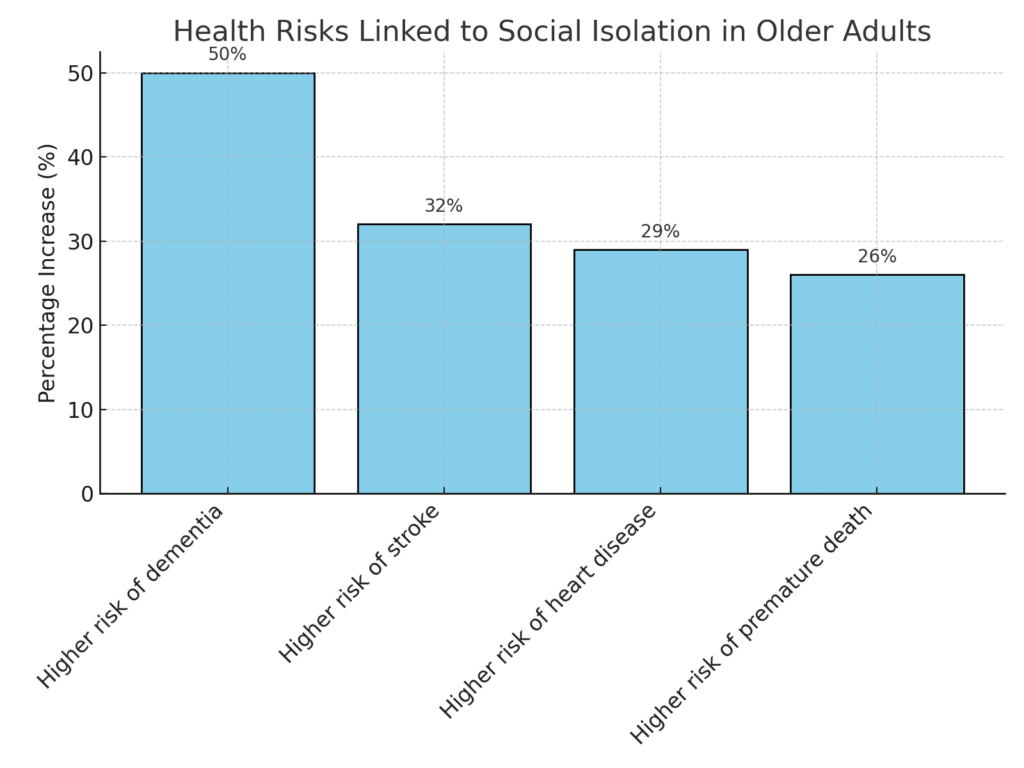How Companionship and Learning Can Save Your Life

When Margaret turned 72, her days felt longer than they used to. Her husband had passed away five years earlier, her children were busy with their own lives, and many of her friends had moved to different cities. She still did her crossword puzzle every morning, but she missed laughing with someone over the silly clues.
Then a neighbor invited her to join a community art class. At first, she hesitated, since she had never painted before. But within a few weeks, she was laughing with new friends, sharing coffee after class, and looking forward to each Wednesday afternoon. Her sleep improved, her mood lifted, and the headaches she had been blaming on “just getting older” slowly disappeared.
Margaret’s story is not unusual. Science shows that companionship is one of the most powerful health boosters available, and it is free.
The Loneliness Crisis
For adults over 50, loneliness is more than a passing mood. It can be a direct threat to health. Research from the National Academies shows that social isolation is linked to a 50 percent higher risk of dementia, a 29 percent higher risk of heart disease, and a 32 percent higher risk of stroke (National Academies of Sciences, Engineering, and Medicine, 2020).
The U.S. Surgeon General has compared the health effects of loneliness to smoking 15 cigarettes a day (Holt-Lunstad, Smith and Layton, 2010). The World Health Organization warns that social isolation is a global public health issue (World Health Organization, 2025).

Why Companionship Improves Health
According to the CDC, about one in three adults in the United States feels lonely and one in four lacks adequate emotional support (CDC, 2023). Loneliness increases stress, raises blood pressure, weakens immunity, and can disrupt sleep and memory (National Institute on Aging, 2024).
For people already managing chronic illnesses, the risks multiply. Lonely heart-failure patients are four times more likely to die, 68 percent more likely to be hospitalized, and 57 percent more likely to need emergency care (National Academies of Sciences, Engineering, and Medicine, 2020).

Learning Together: The Companion Advantage
Companionship works on its own, but pairing it with learning creates even greater benefits. When people take classes, join clubs, or learn new skills together, they stimulate their minds and strengthen their social bonds at the same time.
This could mean joining a computer literacy workshop, picking up gardening with a neighbor, or trying a new fitness class. The laughter over small mistakes, the celebration of shared successes, and the simple act of showing up together can lift mood, sharpen thinking, and build confidence.
Margaret found her spark again through an art class. For someone else, it might be photography, dance, or even a book club that meets at the local café.
The Threat to Connection
Unfortunately, many programs that keep older adults connected are under threat. Federal funding changes could reduce access to community services such as friendly visiting programs, meal deliveries, and group learning opportunities (CBS News, 2025). Without these, many older adults could lose vital opportunities to connect. So reach out to your local government, write a letter and voice your concerns so that we don’t lose those important programs that save lives everyday.
How to Build Companionship and Protect Your Health
If you are over 50 and want to protect your health, here is a simple starting point:
-
Join One New Group This Month
-
A class, club, or volunteer project that interests you.
-
-
Reach Out to One Old Friend
-
Schedule a coffee or video call.
-
-
Mix Learning with Socializing
-
Pick something that challenges your mind and involves other people.
-
Final Thoughts
Loneliness can quietly chip away at health, but companionship has the power to restore it. Margaret’s life changed when she picked up a paintbrush alongside new friends. Yours can change too. The key is to take the first step, and invite someone to join you.




Leave a Reply